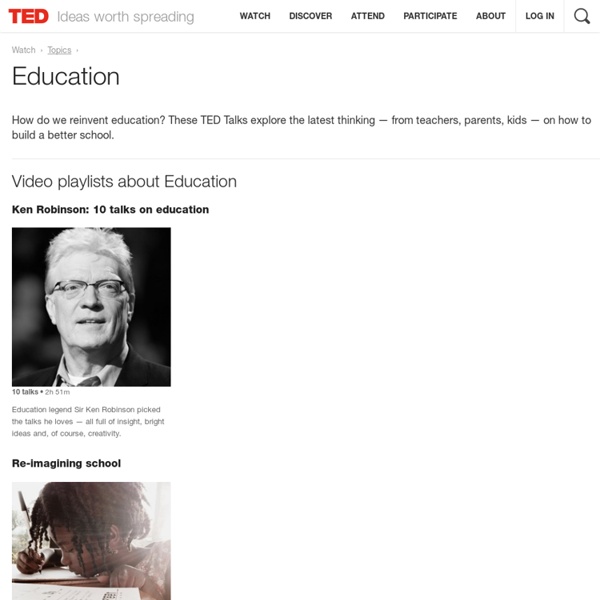



http://www.ted.com/topics/education
Skolans urinvånare måste förstå Vi pratar om att skolan och dess urinvånare (lärare och skolledare) måste flippa klassrum, öppna dörrar, samarbeta, bedöma för lärande, bygga relationer. Vi läser John Hattie och Dylan Wiliam och många andra skolforskare som säger i princip samma sak: lärande är sociokonstruktivistiskt. Det händer när en individs världsbild möter en annan individs världsbild och någon form av reflektion sker. Utgångsläget är en relation och effekten är utveckling. Och så trillar vi likt förbaskat ner i den gamla klosterskolegropen gång på gång. ”Läraren ska kunna mer än eleven”. ”Läraren ska katederundervisa och både ställa frågorna och kunna alla svaren”. ”Endast så får läraren tillbaka den auktoritet som hen borde ha”. 8 Technologies That Will Shape Future Classrooms What does the future of learning hold? What will classrooms of the future be like? Emerging technologies such as cloud computing, augmented reality (AR) and 3D printing are paving the way for the future of education in ways we may have yet to see.
Puentedura – förändrad undervisning, en-till-en och SAMR-modellen – Det går inte att sätta ny teknik i lärares händer och tänka ”that’s it”. Teknik i sig ger inte några förbättrade resultat, säger skolforskaren Dr. Ruben R. Puentedura. Han har precis börjat föreläsa i en fullpackad föreläsningssal. 10 Emerging Education Technologies Are you or your students wearing your Apple Watches to school, and if so, are you using them as part of your curriculum? What about the use of digital textbooks, adaptive learning, collaboration with other schools or flipped classrooms? These technologies represent some of the cutting edge tools and trends in education. While some are being implemented now, regular use of others is on the (not to distant) horizon. We’ve scanned the gurus’ lists and found the top technologies that educators need to prepare for in the next one to five years. Image via Flickr by Kārlis Dambrāns
"The Big 5 saknar tyngd" Undervisningen i skolan bör utgå från de ämnesspecifika förmågor som avslutar kursplanernas syftestexter. Dessa uttrycker en kärna av vad varje skolämne ska utveckla hos eleverna. Både det centrala innehållet och kunskapskraven vilar i de ämnesspecifika förmågorna. Men universitetslektorn Göran Svanelid har lagt fram ett alternativt förfaringssätt som fått stor spridning och uppmärksamhet. 12 Emerging Educational Uses of Technology That are the Most Exciting Right Now Well, it's that time of year again … the start of a new school year. With it often comes the irresistible urge to make another list, or even better … many lists! Lists help us to plan, and they can also help us reflect and assess. One list I really enjoy putting together as we head into a new academic year is an updated look at which educational uses of technology have shown the most promise over the last year. Which tools and techniques most excite me as I look forward to another year of striving for continuous improvement as a teacher, technologist, and #edtech advocate? And as different technology uses take the spotlight, which of them are standing out a little less?
New: Bloom's Taxonomy Planning Kit for Teachers March 28, 2014 Somebody shared with me this wonderful Bloom's Taxonomy Planning Kit for Teachers and want you to have a look as well. The image is huge and so can't upload it here but you can use the provided link to access the original version. The reason why I am sharing this work here is because it provides a new way to think about Bloom's Taxonomy. In Bloom's Taxonomy Planning Kit, you will be offered with a variety of key words, action verbs, outcomes and questions related to each of the thinking levels in the taxonomy. Here is the link of the original chart, try to zoom it in to make it legible.
The 5 Emerging Educational Technologies You Should Know about January31, 2014 The educational landscape is witnessing a drastic change due to the use and integration of emerging technologies. However, though these changes are revolutionary but they are still far from being transformative because the gap between the technologies our students are using out of school and the ones they have access to inside the walls of school is widening. With the emergence and massive uptake of these new emerging technologies, there appeared a new learning culture one which is catalyst of the culture schools should encourage and cultivate. And until we get past the CIPA act and other inhibiting practices and policies, this gap will keep on widening. Today, I want to share with you this handy infographic that features 5 examples of emerging technologies which have been or are expected to be used in the classroom. These are :
Betygsinflation och missförstånd Skolverket gick den 2:a maj ut med ett förtydligande och en utvidgad tolkning av begreppet “till övervägande del” som används för betygen D och B. Det dröjde inte länge innan rubrikerna i tidningarna gav intrycket att det nu blivit mycket lättare att få höga betyg.Det dröjde heller inte många timmar innan missuppfattningarna kring förtydligandet började cirkulera. Inte blev det bättre idag (22/5) när SVT.se publicerade en artikel om att betygen skapar oro och irritation. What every teacher should know about ... memory There is a wealth of psychology research that can help teachers to improve how they work with students – but academic studies of this kind aren’t always easy to access, or to translate into the realities of classroom practice. This series seeks to redress that, by taking a selection of studies and making sense of the important information for teachers. No one study or journal can provide a definitive answer, but they can help offer some guidance. Some of the studies I will choose in these articles are iconic, some quirky, some are large scale, and some have a small sample size. But all of them look to help answer the question: how can we help our students do better at school? We begin with a study on memory.
samlade intryck och idéer